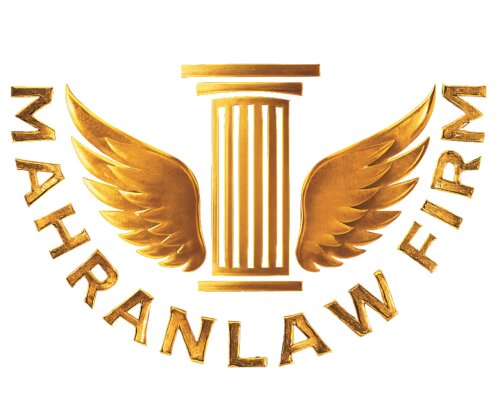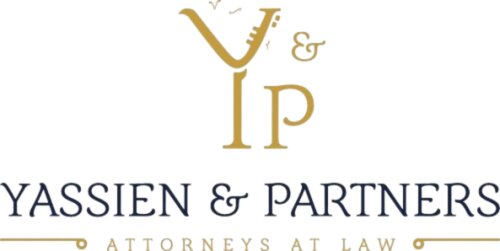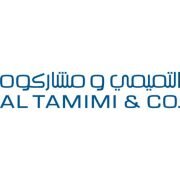Best Lawyers in Agouza
Share your needs with us, get contacted by law firms.
Free. Takes 2 min.
List of the best lawyers in Agouza, Egypt
Egypt Legal Questions answered by Lawyers
Browse our 2 legal questions in Egypt and read the lawyer answers, or ask your own questions for free.
- Start up business
- Looking for start up company
-
Lawyer answer by Nexus & Charter Law Firm
Thank you for your inquiry. Our firm specializes in company formation in Egypt. If you are looking to expand your investments and achieve your business goals in Egypt, it would be our pleasure to cooperate with you.
Read full answer - عقود الامتيازات التجارية والخدمات
- تفاصيل اكثر للحصول والدعم للحصول على أمتياز تجاري
-
Lawyer answer by Alraheely Law Firm
Good Afternoon. Through our work and achievements in mergers and acquisitions, commercial franchises and other commercial contracts, we provide you with a range of services and comprehensive legal support regarding franchise agreements, including non-disclosure agreements and field support inside and...
Read full answer
About hiring a lawyer in Agouza, Egypt
Hiring a lawyer in Agouza follows the same basic steps as in other parts of Egypt, but with some local practicalities to keep in mind. First, identify lawyers or law firms that handle the area of law you need - for example family law, criminal law, real estate, labor disputes, or business and commercial matters. Contact them for an initial consultation to discuss facts, likely legal routes, estimated costs, and required documents. If you decide to proceed, you and the lawyer will agree on the scope of work, fees and payment terms, and the lawyer will usually prepare an engagement letter or power of attorney when formal representation at courts or government offices is required.
Most lawyers in Agouza work in Arabic, and official court filings and government interactions are in Arabic. If you are not fluent in Arabic, ask whether the lawyer offers services in your language or whether you should bring a certified translator. For foreigners, certain documents may need translation and authentication - your lawyer will advise on this and can assist with notarization and legalization where needed.
Why you may need a lawyer
People seek lawyers in Agouza for many common reasons. Typical situations include:
- Criminal charges or investigations where immediate legal advice and representation can protect rights and help navigate police procedures.
- Family law matters such as divorce, child custody, maintenance, and inheritance disputes under Egyptian personal status law.
- Property and real estate transactions or disputes - including title verification, sale and purchase contracts, registration, and boundary conflicts.
- Traffic accidents and insurance claims - to secure compensation and handle administrative or criminal aspects if applicable.
- Labor and employment disputes - wrongful dismissal, unpaid wages, social insurance claims, and disputes with employers.
- Commercial and business matters - forming a company, drafting or reviewing contracts, debt recovery, or litigation between businesses.
- Administrative procedures before government agencies - licensing, permits, municipal disputes, or immigration and residency matters for non-nationals.
- Civil disputes - contract breaches, debt claims, and enforcement of judgments.
Local laws overview
When you consult a lawyer in Agouza you will primarily be dealing with Egyptian national law. Key points to know:
- Legal system - Egypt follows a civil law system based on codes and statutes. Court decisions do not create binding precedent in the same way as common law jurisdictions, but judicial practice is influential.
- Language - Arabic is the official language for legal proceedings and government records. Official documents and court submissions must usually be in Arabic.
- Courts - Civil, criminal, family, and administrative disputes are handled in the appropriate branches of the courts. Many disputes can also be resolved through alternative dispute resolution - mediation or arbitration - when contractually agreed.
- Personal status and family law - Family matters for Muslims are governed by Islamic personal status rules, while other recognized religious communities follow their own personal status laws. These rules affect marriage, divorce, custody and inheritance.
- Property and registration - Real estate transactions require proper title checks, tax clearance, and registration with the Land Registry. Registered title and clear chain of ownership are essential.
- Criminal procedure - Arrest, detention and interrogation are governed by criminal procedure law. Detainees have rights to counsel, and criminal representation is critical early in the process.
- Labor law - Protects employees through regulations on contracts, working hours, social insurance, termination procedures and severance. Administrative bodies and courts handle disputes.
- Foreigners - Non-Egyptians must ensure compliance with immigration, residency and property ownership rules. Some transactions require additional approvals or different procedures for foreigners.
Frequently Asked Questions
How do I find a reliable lawyer in Agouza?
Start by asking for recommendations from friends, family or business contacts in Cairo and Giza. Look for lawyers who practice in the specific field you need. Meet for an initial consultation to assess experience, communication style and fee terms. You can also ask the local bar association for referrals and confirm a lawyer's membership and standing.
How much does a lawyer in Agouza usually cost?
Fees vary by type of case, lawyer seniority, and whether the matter is transactional or litigation. Common fee structures include hourly rates, fixed fees for specific services, and retainers plus success fees. Ask for a written fee agreement and an estimate of likely total costs. Court, filing and expert fees are usually additional.
Do I need to sign a power of attorney?
Yes - if your lawyer needs to represent you at court, file documents on your behalf, or interact with government offices, you will often sign a power of attorney. The document is typically in Arabic and may need notarization. For foreign clients, additional authentication or consular legalization may be required.
Can a legal consultation be free?
Many firms and lawyers offer a short initial consultation free or at a low fee to assess your case. Free consultations usually cover a basic review and next steps, but detailed advice or document drafting is likely to be billed. Always confirm whether the initial meeting is free before you attend.
How do I check a lawyer is licensed and in good standing?
Ask to see the lawyer's membership card from the Egyptian Bar Association or the relevant local bar. You can also inquire at the Giza or Cairo bar association offices about disciplinary history. Reputable firms will be transparent about credentials and past case experience.
What if I cannot afford a private lawyer?
In criminal cases, defendants have a right to appointed counsel if they cannot afford a lawyer. There are also legal aid programs and non-governmental organizations that provide assistance on certain issues. Your local bar association can provide information about pro bono services and legal aid options.
How long will my case take?
Timeframes vary widely. Simple transactional matters may be resolved in days or weeks, while litigation can take months or years depending on court backlog, appeals and the complexity of the dispute. Your lawyer should provide a realistic timeline and keep you updated on major developments.
Can I change lawyers during a case?
Yes, you can change lawyers. Inform the current lawyer in writing and sign a new power of attorney with the new lawyer. Be mindful of fee obligations to the previous lawyer for work already performed and any contractual notice requirements in the engagement letter.
What documents should I bring to the first meeting?
Bring any contracts, correspondence, official notices, police reports, court papers, identity documents and any documentation that explains the dispute. For property matters bring title deeds and registration documents. If documents are not in Arabic, ask your lawyer if certified translations are needed for the meeting.
How do I make a complaint if the lawyer acts unprofessionally?
Raise the issue first with the lawyer or the firm. If unresolved, file a complaint with the local bar association or the Egyptian Bar Association. Complaints can cover breaches of professional conduct, fee disputes and other misconduct. Keep records of communications and any engagement documents to support your complaint.
Additional resources
For authoritative information and official procedures, consult the following government resources:
- Egypt - Official Government Services Portal: Other helpful organizations and resources to contact or consider:
- Giza and Cairo local bar associations - for referrals, membership verification and information about pro bono help.
- Public prosecution and police stations - for criminal investigations and initial procedures.
- Consumer protection bodies and labor offices - for complaints about businesses or employment rights.
- Non-governmental organizations that offer legal assistance in areas such as family law, human rights or refugee assistance.
Next steps
1. Prepare your documents - gather all papers, IDs and correspondence related to your matter and prepare a concise summary of the facts and timeline.
2. Identify the right type of lawyer - choose a lawyer who specializes in the legal area relevant to your issue and who has experience in local courts or administrative bodies.
3. Arrange an initial meeting - ask about fees, likely steps, estimated timeline and whether they provide services in your language. Confirm whether the first consultation is free and what documents to bring.
4. Agree terms in writing - request an engagement letter or fee agreement that sets out the scope of work, fees, retainer, billing and how to terminate representation.
5. Authorize representation - sign the required power of attorney or authorization documents so your lawyer can act on your behalf where necessary.
6. Stay involved - maintain regular communication, provide documents promptly, and ask for plain-language explanations of legal options and risks. Document important conversations by email where possible.
7. Consider alternatives - ask your lawyer about mediation or arbitration where appropriate as faster or less costly alternatives to full litigation.
Final reminder - this guide is for informational purposes and does not replace legal advice. For a solution tailored to your situation, consult a qualified lawyer in Agouza who can review the facts and advise you on the applicable law and next steps.
Lawzana helps you find the best lawyers and law firms in Agouza through a curated and pre-screened list of qualified legal professionals. Our platform offers rankings and detailed profiles of attorneys and law firms, allowing you to compare based on practice areas, experience, and client feedback.
Each profile includes a description of the firm's areas of practice, client reviews, team members and partners, year of establishment, spoken languages, office locations, contact information, social media presence, and any published articles or resources. Most firms on our platform speak English and are experienced in both local and international legal matters.
Get a quote from top-rated law firms in Agouza, Egypt — quickly, securely, and without unnecessary hassle.
Disclaimer:
The information provided on this page is for general informational purposes only and does not constitute legal advice. While we strive to ensure the accuracy and relevance of the content, legal information may change over time, and interpretations of the law can vary. You should always consult with a qualified legal professional for advice specific to your situation.
We disclaim all liability for actions taken or not taken based on the content of this page. If you believe any information is incorrect or outdated, please contact us, and we will review and update it where appropriate.
Refine your search by selecting a practice area.

































